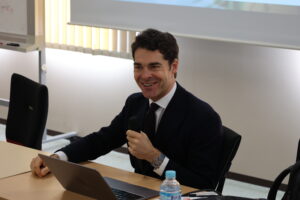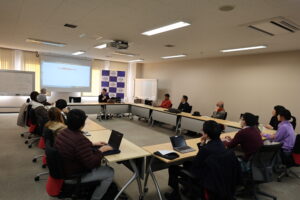Event Overview:
On January 8, 2025, the Hitotsubashi University Institute for Global Governance Research (GGR) held the 35th GGR Brown Bag Lunch Seminar titled “The Hijacking of Europe: How National Politicians Took the EU Away from Its Citizens and How to Win It Back,” featuring Alberto Alemanno, Professor at HEC Paris, France.
Professor Alberto emphasized how national politicians often manipulate the EU for domestic agendas, scapegoating it for failures while claiming credit for its benefits, such as funding and trade deals. Populist rhetoric has portrayed the EU as a detached bureaucracy, widening the gap between the Union and its citizens and deepening the perceived democratic deficit. Decisions at the EU level, filtered through national governments, often lack clarity and trust, while short-term national priorities overshadow collective responses to challenges like migration, climate policies, and economic solidarity.
According to Dr. Alemanno, key factors include weak communication by EU institutions, opaque decision-making processes, and limited citizen engagement. Declining voter turnout in European elections and rising nationalism have further emphasized sovereignty over shared responsibility, undermining the EU’s supranational ideals. To address this, the speaker argued that the EU must prioritize reforms centered on transparency, accountability, and active citizen participation. Strengthening the European Parliament’s role and promoting EU successes through public awareness campaigns can bridge the gap. Addressing local concerns like jobs and healthcare and fostering European identity through education are essential steps.
During the Q&A, the topic “Which EU regulations create the most tension with member states, and why?” highlighted key areas of conflict, including immigration, environmental policies, trade, and social issues. The speaker stressed that tailored support, flexible implementation, and better communication could mitigate these tensions by balancing national interests with EU goals.
In conclusion, the EU must overcome divisive national politics by embracing accountability, transparency, and active citizen involvement to rebuild unity and ensure it remains a democratic force representing shared aspirations.
[Event report prepared by]
Billal Hossain (Doctoral student, Graduate School of Law, Hitotsubashi University)


